Call for participants: The Power of Data: Collecting and using data to tackle LGBTI homelessness
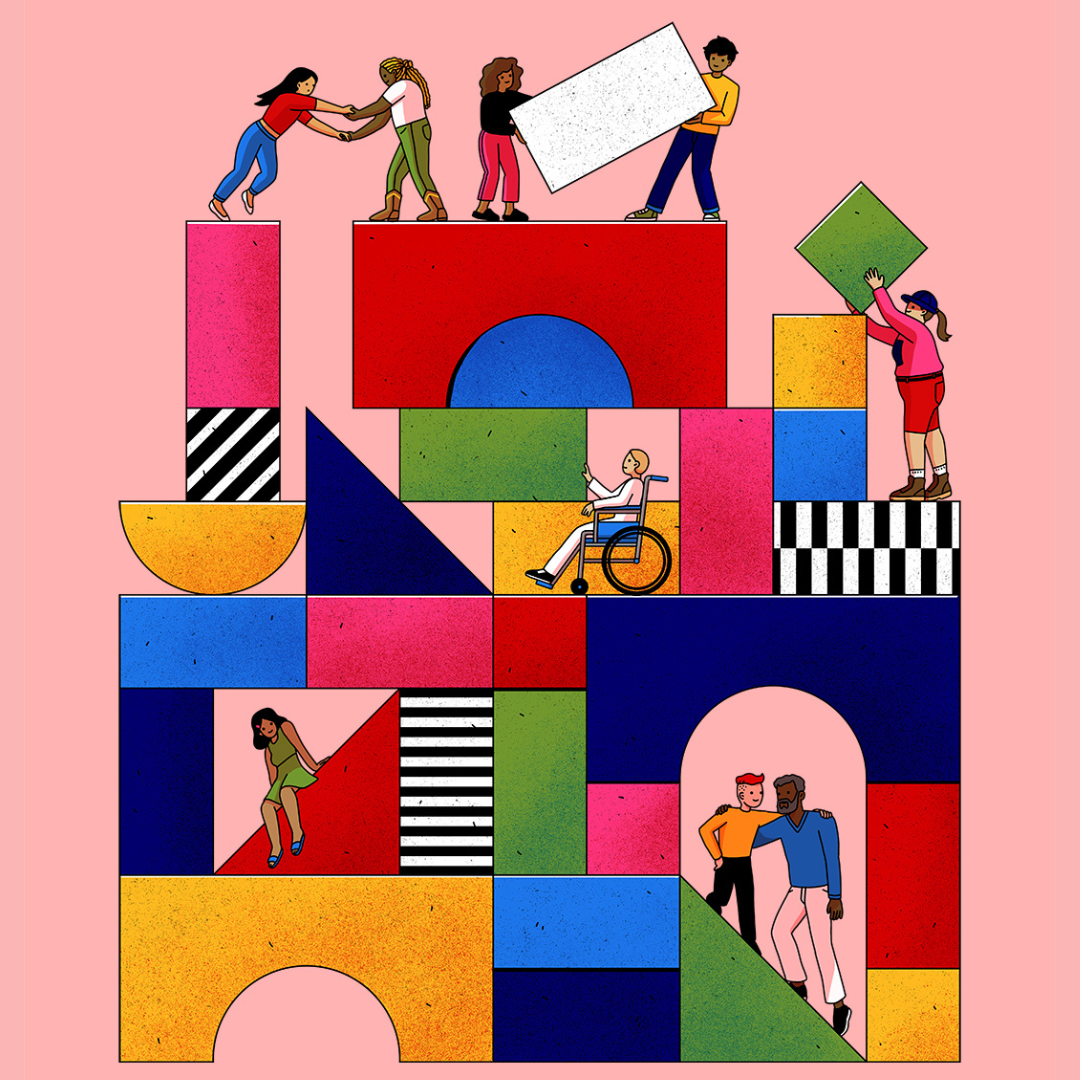
The training is organised by ILGA-Europe and delivered by dedicated researchers from Analysis Group.
It will take place in Brussels on 28 & 29 March 2025, with arrival on 27 March and departure on 30 March.
We know that data is key in the work on LGBTI homelessness. We need it to inform and support advocacy strategies and actions, campaigns, and alliance-building work. At the same time, very few groups can run full-scale research or outsource it.
Yet, organisations often already have access to unique data and evidence through their ongoing work and relationships with communities and allies. Leaning in on what is already in place, data gathering does not need to be a massive and expensive undertaking, and it can be done accessibly and creatively.
This training will equip LGBTI organisations working on LGBTI homelessness with accessible and fit-for-purpose ways to collect data and translate it into advocacy asks.
What you will get from the training
Here is a glimpse at what you can expect over the two days:
- A learning journey, from formulating a research question to translating it into a survey, to understanding the subsequent data and linking it back to your advocacy goals
- Tips and tricks for in-house data analysis and report writing in support of your advocacy goals
- A half-day group session in which you will apply and develop skills in a collaborative setting guided by the trainers
- Networking and mutual learning with a group of 15 activists from LGBTI organisations working on LGBTI homelessness across Europe
- Signposting to further resources and the potential of more follow-up coaching after the training.
The programme will be shared with selected participants closer to the event.
Practical details
- Training dates: 28 & 29 March, 2025
- Travel dates: arrival on 27 March, departure on 30 March. (Departure in the evening of 29 March is also possible provided that you attend the whole event)
- Language: English
- Location: Brussels
- Participation costs are covered by ILGA-Europe (see below)
- Participants are selected through an open competitive call. Number of participants: up to 15.
Who is invited to apply
ILGA-Europe offers this training to LGBTI organisations and groups from across Europe.
For The Power of Data to be an enriching experience, our aim is to bring together a pool of diverse organisations and activists in terms of strategies, profiles, experiences, and geography. Thus, we invite a maximum of one person from an organisation to apply.
The Power of Data training is right for your organisation if:
- It is an LGBTI organisation based and operating in Europe [1];
- Your organisation works on addressing LGBTI homelessness or has concrete plans that require using evidence on LGBTI homelessness, and needs to build its capacity in gathering and analysing data to advance this work;
- Your organisation has a clear vision of how the skills gained during the training will support your work on LGBTI homelessness;
- Your organisation has the capacity and plans to integrate the knowledge and skills gained in the training in its work;
- You, as the delegated participant, are supported by your organisation to dedicate time to the event, attending it in full, and to bring the knowledge back to the team.
As the delegated participant, you do not need to have in-depth skills in research or advocacy, but you need to hold in-depth knowledge of your organisation’s work on LGBTI homelessness and its specific needs and activities around data gathering, and you should be in a position to bring the knowledge from the training back to your organisation to apply it in practice.
[1] For this call Europe is considered to include the following countries: Albania, Andorra, Armenia, Austria, Azerbaijan, Belarus, Belgium, Bosnia and Herzegovina, Bulgaria, Croatia, Cyprus, Czech Republic, Denmark, Estonia, Finland, France, Georgia, Germany, Greece, Hungary, Iceland, Ireland, Italy, Kosovo, Latvia, Liechtenstein, Lithuania, Luxembourg, Malta, Monaco, Montenegro, Netherlands, North Macedonia, Norway, Poland, Portugal, Republic of Moldova, Romania, Russian Federation, San Marino, Serbia, Slovak Republic, Slovenia, Spain, Sweden, Switzerland, Turkey, Ukraine, United Kingdom.
How to apply
Please choose one representative from your organisation to apply.
Submit a completed application form by December 16, 2024, 23:59 (CET) to Nadzeya Husakouskaya at nadzeya@ilga-europe.org. Please indicate the title of the event (The Power of Data) in the subject line.
We will inform you about the outcomes of the selection by January 15, 2025 the latest.
Accessibility note: We aim at ensuring that this event is accessible for everyone in attendance. Please share your accessibility needs in the application form.
Costs of participation
ILGA-Europe covers participation costs for all selected participants, specifically:
- Accommodation in shared rooms with breakfast, with check-in on 27 March and check-out on 30 March;
- Travel costs to and from Brussels. If you are selected, you will need to book your own travel within the approved amount. You will get these costs reimbursed after the event, upon full attendance. If your organisation is working without any funding and unable to pre-book tickets for you, you can be exempt from this requirement. More information will be shared with selected participants;
- Visa costs and compulsory insurance;
- Joint meals: lunches and coffee breaks on 28 and 29 March, and a joint dinner on 28 March;
- Per diem in cash at the event that will cover the rest of the meals and subsistence on 27-30 March.
Can your organisation cover participation costs of its delegate fully or partially? Please mention it in the application form. This will allow us funding more organisations to attend the training in case of high competition. Please note that ability to contribute by cost-sharing is not a selection criterion.
Trainers and organisers
The training is organised by ILGA-Europe and delivered by a group of researchers from Analysis Group, building on our partnership throughout 2023-2024.
ILGA-Europe partnered with Analysis Group to build the movement’s knowledge and skills in gathering and using data in activism on LGBTI homelessness.
Analysis Group is one of the largest international economics consulting firms and a pro-bono partner of ILGA-Europe. From August 2023 to August 2024, Analysis Group joined ILGA-Europe’s No One Left Behind programme on LGBTI homelessness as research experts and coaches, supporting five LGBTI organisations in their research and data gathering projects on LGBTI homelessness.
Trainers:
- Mario Luca (he/him). Mario joined Analysis Group after completing his PhD in economics on extreme right voting and the refugee crisis in Italy. He specialises in empirical analysis for damage estimation and big data and machine learning applied to competition. Mario worked on multiple political projects and is currently coordinating the partnership with ILGA-Europe and AG Pride, the firm’s LGBTI association, in Europe.
- Giovanni Morzenti (he/him) is an economist who specialises in antitrust policy, competition matters and litigation. He volunteered in the epilepsy ward of the Piccolo Cottolengo di Don Orione in Milan and at the Caritas soup kitchen in Bergamo, where homeless people could find a warm place to eat and programs to access secure housing.
- José Alfonso Muñoz-Alvarado (he/him) is an economist consultant with a Ph.D. in Family and Labor Economics. He specialises on applying data analysis to support competition cases and market studies. Alfonso brings a collaborative approach to projects, handling data analysis and working closely with team members across disciplines.
Coordinator: Nadzeya Husakouskaya (they/them), Senior Programmes Officer, ILGA-Europe. Nadzeya leads No One Left Behind programmes at ILGA-Europe focusing on socio-economic justice.
Contacts
If you have any questions about The Power of Data, please reach out to Nadzeya via nadzeya@ilga-europe.org.
Intersections: The LGBTI II Survey – Homelessness Analysis
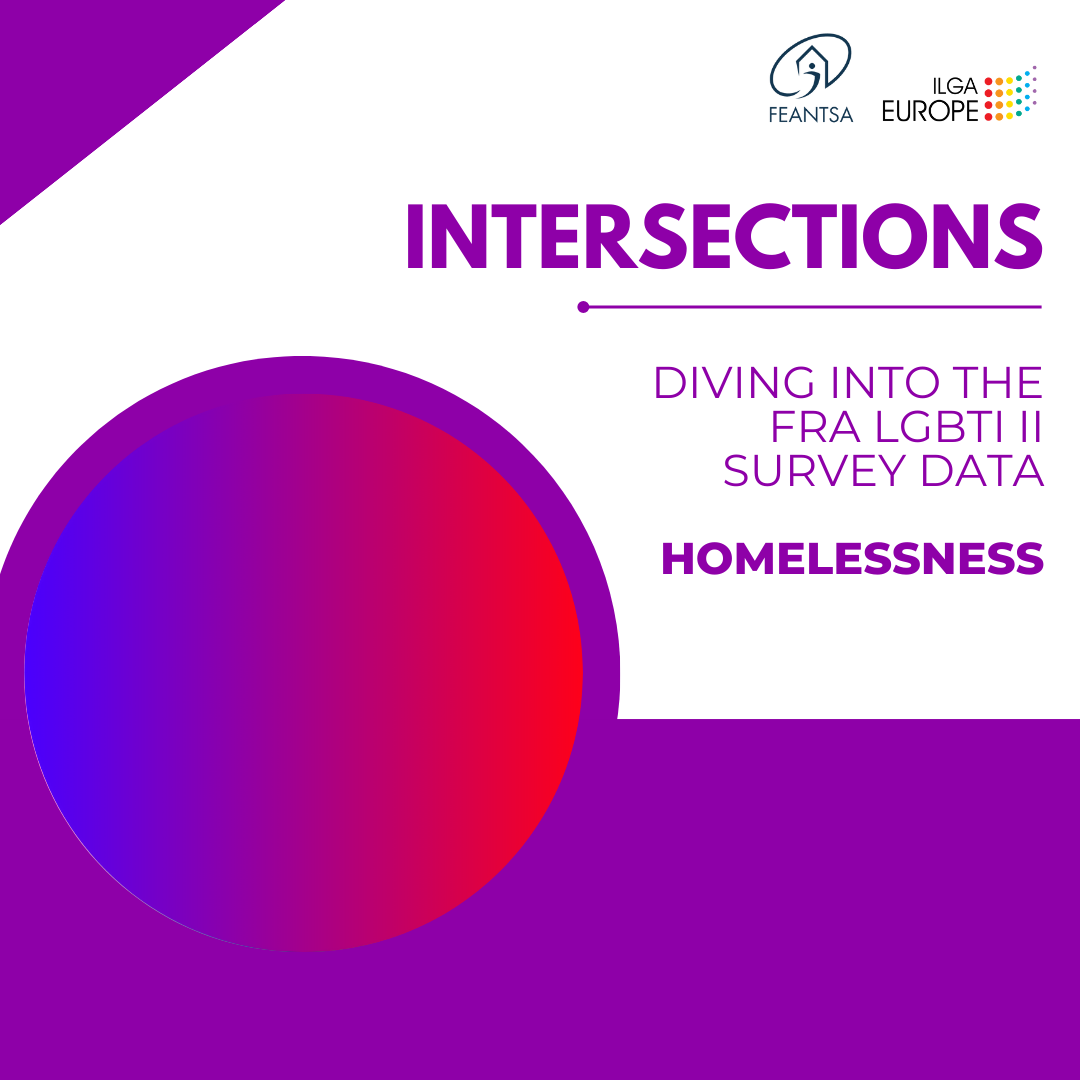
Disaggregated data, which can look deeply into the lived experiences of marginalised people, is a key demand of LGBTI and other human rights groups. With this in mind, over the last year ILGA-Europe have been partnering with a variety of NGOs in the region to analyse the FRA 2019 LGBTI Survey II data and pull out experiences of those experiencing intersectional marginalisation. This work is based on analysis co-commissioned by ILGA-Europe and TGEU.
This briefing analyses the results of the FRA LGBTI Survey II and summarises the relevant data about experiences of homelessness among the LGBTI community.
Call for project proposals: Addressing LGBTI homelessness in the EU

Why we are launching this programme
In 2020, the Fundamental Rights Agency (FRA) released a survey that estimates that one in five members of the LGBTI community in the EU experience homelessness, rising to one in three for trans people and nearly 40% for intersex people. Lack of institutional support, social rejection and identity-related family conflict are amongst the causes for LGBTI homelessness. Undeniably, the pandemic, deepening socio-economic inequalities and the rise of anti-LGBTI rhetoric, anti-trans attacks and the anti-gender movement further exacerbated the situation around homelessness of LGBTI communities, especially with youth.
Yet, LGBTI homelessness remains hidden in Europe. We lack the data and the robust research to fully understand the prevalence, forms and dynamics of LGBTI homelessness in different local contexts in Europe. The lack of knowledge across the European Union leads to a lack of targeted services, absence of national policies specifically addressing the issue of LGBTI homelessness, limited funding, if any, for programmes that include or focus on unhoused LGBTI communities. Often, LGBTI organisations have to step up to support their communities in situations of homelessness where there are gaps in services and when assistance is unavailable or inaccessible.
It is well known that access to housing is a precondition for access to health, employment, education, and social services. This is why we are launching this programme, which will sustain the vital work of understanding the root causes and forms of LGBTI homelessness and advocate for improving access of LGBTI communities to services and housing.
The programme focuses on data collection, advocacy efforts, and/or collaboration between sectors, systems and services in addressing LGBTI homelessness.
Through this programme we want to enhance and advance the work of LGBTI organisations with considerable existing expertise in the field. We believe that having a small group of strong organisations with a strengthened experience in the area of LGBTI homelessness will bring new learnings and insights that can be shared with a wider movement and benefit other organisations who are at the beginning of their work on homelessness in their respective countries.
Structure of the programme
The programme has two interconnected components:
- Financial support for the implementation of a project (20.000 euro per project), AND
- Peer-learning that will bring grantee partners together (on-line) on a regular basis to strengthen the network amongst organisations, enhance possible collaboration, exchange learning, share challenges and solutions.
Important! When you apply for funding under this call, please be aware that you commit to both of the components of this programme.
Aim of the programme
The aim of this programme is to:
- Bring together a small group of 6-7 LGBTI organisations across the European Union that have demonstrated experience in understanding, addressing and/or preventing LGBTI homelessness in their respective countries and/or regions;
- Support, strengthen and advance their work on LGBTI homelessness through a combination of grants and regular peer-learning/networking meetings.
Types of organisations we will support
LGBTI-run organisations that
- are based and work with LGBTI communities in the European Union; AND
- have demonstrated experience, history and track-record of working on LGBTI homelessness.
Non-registered organisations are eligible to apply if they partner with a registered legal entity that is able to receive funds from ILGA-Europe. This entity cannot be a physical person.
Your experience in working with LGBTI homelessness can be through investigating the root causes, analysis of the bigger picture, focusing on prevention and/or short-term solutions (for example, running shelters or providing services). The projects submitted to this programme, however, need to fall within the scope described below, in the section “Types of projects…”. This programme is not designed to support running a shelter and providing direct assistance.
Type of projects we are looking to support
We understand that the most immediate hands-on form of addressing LGBTI homelessness is providing shelter and other services. However, this call is designed to support systemic and sustainable efforts to address the gaps in the existing systems, not filling these gaps by own initiatives. Thus, we won’t be able to support the running of shelters or service provision. This call invites projects that aim at data collection, strategic collaborations with existing organisations and service providers working with homelessness, and advocacy with public authorities to ensure that practices and policies around homelessness acknowledge, account for and include experiences of LGBTI communities and pro-actively meet the needs of these communities.
Therefore, we are looking for projects that will fall into one, two or three of the following areas of work.
- Data collection and research activities to map and/or document the scope, forms, root causes and consequences of LGBTI homelessness in a given local context*.
- Developing/strengthening alliances and partnerships with service providers and/or other partners working on homelessness and socio-economic justice with the explicit purpose of fair distribution of labour amongst the actors in this field and with focus on influencing their practices so they acknowledge experiences of LGBTI communities and pro-actively meet the needs of these communities
- Advocacy activities aimed at establishing new and strengthening existing contacts and collaborations with public authorities and governmental officials with an aim of developing, improving and implementing effective public policies to reflect the lived experience of homeless LGBTI people and meet their needs.
*The documentation and research projects need to have a clear dissemination/advocacy plan that clearly explains how outcomes of documentation and research activities are going to be used in further work, including advocacy and alliance-building.
Key information
- ILGA-Europe aims to support up to 7 organisations with grants of €20,000 each.
- The project should be implemented within a period of 1 July 2023 until 1 July 2024, i.e. 12 months Only costs between 1 July 2023 to 1 July 2024 will be eligible. The final reporting will be due no later than 15 July 2024.
- Peer-learning meetings will happen on-line on a regular basis, approximately every two months during the project period. Over the course of 12 months, we will have up to seven meetings (up to three hours each). The first meeting will be a webinar to inform you on the financial and administrative requirements under this call. We invite you to account for this staff time in your budget.
Budget criteria
The types of costs covered through this fund are direct project costs and can include:
- Personnel costs
- Travel and event costs (both physical and digital)
- Costs related to obtaining external expertise and/or services associated with the implementation of the project
- Interpretation and translation costs
- Communication activities and campaigns related to the aim of this call, including social media and traditional media fees, production of materials, design, printing
- A fair proportion of administrative costs or core organisational costs which are linked to the implementation of the project (rent, utilities, IT, technology and telecommunications, accounting, administrative fees, fiscal sponsor fees, depreciation of new and existing equipment).
Under this call there is no budget percentage limitation to covering personnel and consultancy costs, as long as they are clearly directed towards the objectives of the call.
Organisational capacity building can be included. Projects can incorporate training, internal learning for staff and/or volunteers and other activities aimed at building the knowledge and skills needed for organisations to take on meet the broader purpose of this call.
Reporting and Communication
The reporting comprises of narrative reports and financial reports.
Narrative reporting: For the duration of the project we will have regular check-in calls with you – a one-hour call every three months. These calls will serve as an informal form of reporting on the content and administrative sides of the project. During these conversations we will discuss the project implementation, threats, opportunities, challenges, and possible capacity building needs. At the end of the project, you will have to submit a final narrative report using a template we will provide. The final narrative report covers key elements of the project implementation (evaluation of activities, reflection on the impact the project had on the local context, target groups and the organisation itself etc)
Financial reporting: Mid-way and at the end of the project, you will need to report financially on how the funds were spent. Financial reporting will require some basic knowledge of Excel and the applicant will require some basic administrative and financial systems in order to manage the grant (e.g. cash management, tracking of expenditure, record-keeping). Full information and guidance on reporting financial and administrative requirements will be provided to successful applicants.
We believe that the broader LGBTI movement can benefit from the learning of these projects. We would like to share learning from the work done under this funding with other LGBTI activists in Europe and Central Asia. This knowledge can be shared through articles, educational materials, online learning sessions among others. Sharing learning will be ILGA-Europe’s responsibility and we will work with you to identify what information can be shared in what ways, and with whom.
Key Things to Consider
In selecting proposals, ILGA-Europe will prioritise projects that:
- Respond to the framework, aim, objectives, and areas of work of this call
- Are implemented by LGBTI-run organisations in the European Union that have a demonstrated experience, history and track-record of working to address LGBTI homelessness
- Demonstrate clear understanding of their local context around LGBTI homelessness
- Present a clear plan for how the envisaged change is going to come about in these contexts
- Seek to establish practices/tools/solutions that can live beyond the project’s lifetime
- Have the potential to enhance the movement’s thinking on LGBTI homelessness (including structural root causes and effects) and working towards socio-economic justice for LGBTI communities in general.
Deadline and Timeline
- Proposals should be submitted using the application form and budget template. The last day to submit your application (deadline) is 1 May 2023, Monday, 23:59 CEST.
- We will review applications and inform all applicants about the results of the selection via the e-mail address provided in the application by 5 June 2023.
- Contracts will be signed with organisations in June 2023. Successful applicants should be available to respond to requests during that period. The fixed start date for all projects is 1 July 2023.
- To submit an application or if you have any questions in the preparation of your project proposal, please contact: nadzeya@ilga-europe.org
Any questions?
All answers were returned via email and are published on this page, in order to support equal access to information among all applicants.
Application documents
Alarming new research shows how LGBTI people are affected every day by inequality
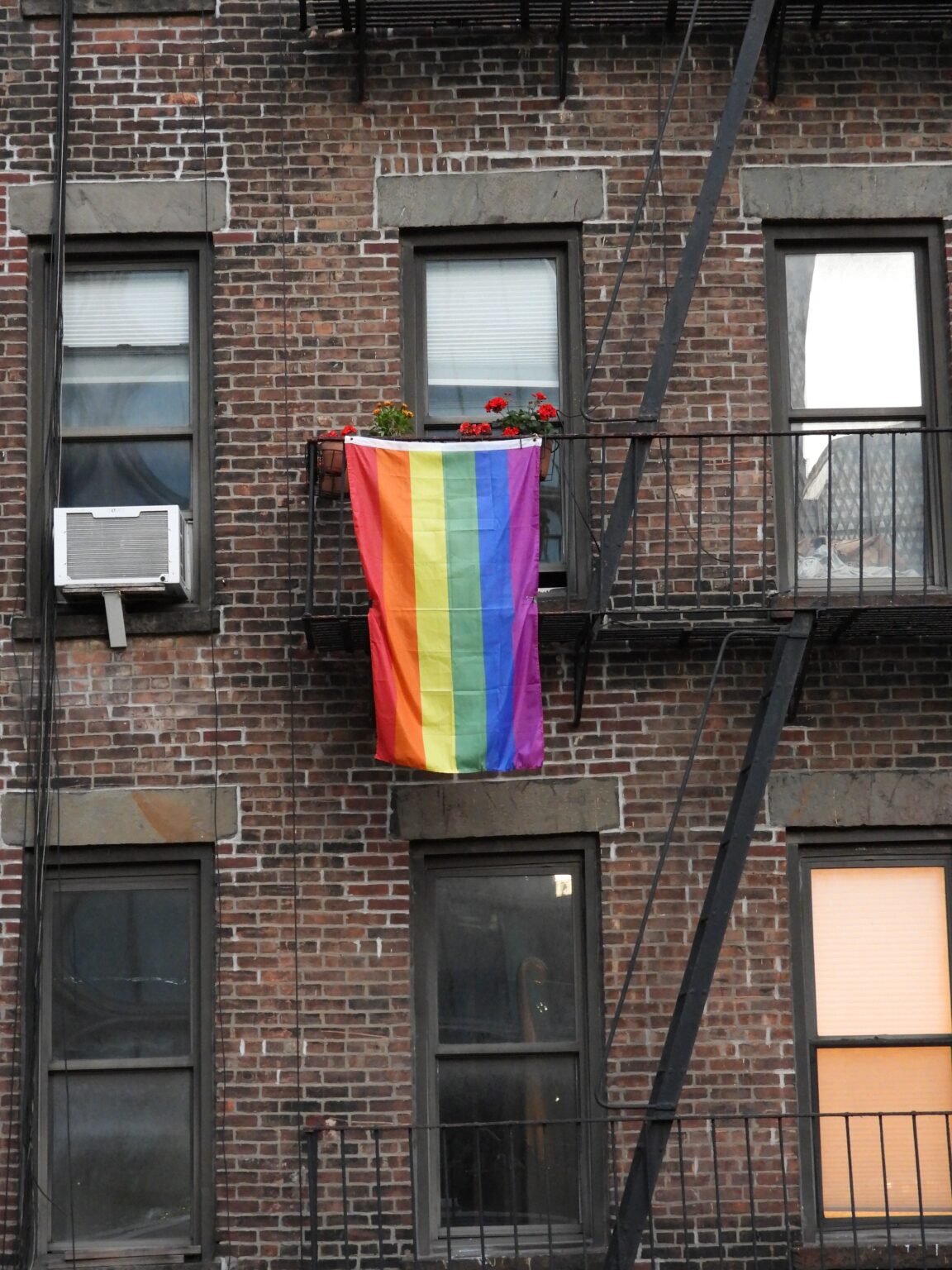
Recent data shows that LGBTI young people perceive the labour market with fear and that most of LGBTI youth living with their families have experienced violence in different parts of Europe. These are among the alarming facts related to the impact of inequality and oppression in LGBTI communities, as identified through ILGA-Europe’s No One Left Behind initiative.
We all may experience highs and lows along our working lives or struggle to find the apartment of our dreams, but chances are that LGBTI people will encounter greater obstacles when looking for job or a home. These are some of the conclusions from the research carried out by grantees of ILGA-Europe’s No One Left Behind fund.
The No One Left Behind fund supported projects addressing socio-economic barriers for LGBTI communities in Europe and Central Asia. Launched in 2020, after the breakout of the global COVID-19 pandemic, the program aimed to enable LGBTI groups and organisations to develop long-term responses to underlying causes of inequalities and oppression, which increase the vulnerability and marginalisation of LGBTI people, especially in times of crisis.
Thanks to No One Left Behind, a number of organisations in Europe and Central Asia mapped the ways in which social and economic inequalities affect the livelihoods of LGBTI people, in particular when these are aggravated by a crisis such as the COVID-19 pandemic. However, these conclusions are only the tip of the iceberg, as there is a real gap in data. Even if comprehensive research is lacking, available evidence already points to the urgency of collecting more information and, above all, taking more action to address the inequalities LGBTI people experience.
Based on the No One Left Behind research, here is a glimpse of the current lived realities of LGBTI people in different parts of Europe:
Access to Employment
? Public officers in access to employment institutions are unaware or not prepared to provide services for LGBT people, and in some cases are homophobic (Kosovo).
? There are high rates of unemployment among marginalised groups such as Roma LGBT people (Serbia).
? LGBTI young people perceive the labour market with fear. Often, they have grown up in homophobic or transphobic families who do not accept them. Schooling experiences are marked with homophobia and transphobia (Romania).
? 25% of interviewed LGBTI youth say that in the absence of a workplace they no longer have money for basic needs, including medical services (Romania).
Safe housing
? On-and-off homelessness is prevalent among surveyed LGBT refugees. Some interviewees reported to sleep at friends’ and changing their location every two days in order to avoid bigger shelters, because of their fear of discrimination (Austria).
? Duration of homelessness among LGBT refugees is typically six to ten months (Austria).
? More than half LGBT youth aged 16 to 29 interviewed live at their family’s home and the majority have experienced some kind of violence (Slovenia).
? 78% of interviewed LGBT youth aged 16 to 29 do not understand their situation as inadequate, although they fit the criteria for inadequate housing (Slovenia).
Trans
? Trans sex workers communities are harshly impacted by violence, exclusion and suicidal ideation (Greece).
? Up to 18 out of 50 trans people surveyed were required to remove their internal genital organs. This was evaluated as very problematic. To require this intervention also prevented persons who wished to transition from doing so (Slovakia).
? Trans people often face issues in their transition due to the lack of preparation of authorities (Slovakia).
LGBT refugees
? The main obstacles encountered by LGBT refugees when seeking support are language barriers and discrimination (Austria).
? 20% of interviewed LGBT refugees receive social benefits. 80% receive support only from individuals from the LGBTIQ community (Austria).
? 95,1% of interviewed LGBT asylum seekers feel depressed and have trouble sleeping. 87% feel anxiety on a regular basis and 41,5% are hopeless about their future (Greece).
? 41% of interviewed LGBT asylum seekers have stated that they have engaged in sexual actions in exchange for food, housing and/or money (Greece).
The frontline: Confronting LGBTI Youth Homelessness
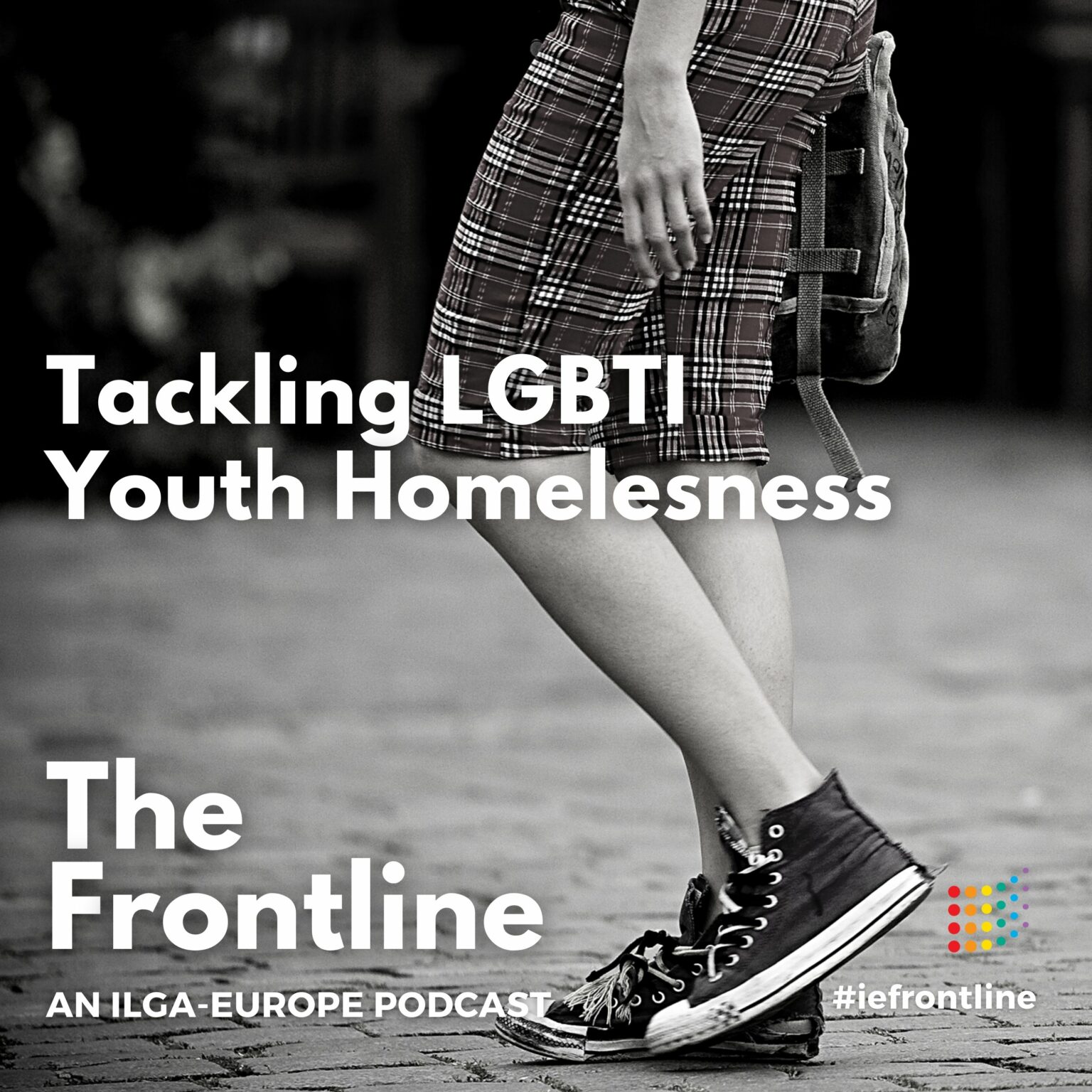
Our 2021 report, in association with Cyndi Lauper’s LGBTIQ Youth Homelessness organisation True Colors United, and the Silberman Centre for Sexuality and Gender (SCSG) at Hunter College in New York, explores the experiences of LGBTIQ focused organisations in Europe working in with young people who have experienced homelessness.
Over 60% of LGBTIQ organisations surveyed for the report said they had worked on the issue. A comparative report from the European Federation of National Organisations Working with the Homeless (FEANTSA), also finds that over 60% of homeless services organisations have dealt with young LGBTIQ people, but often without any training or support.
Our guests for this conversation about the rising issue of young LGBTI people being made homeless in Europe are author of the ILGA-Europe report, Dr Jama Shelton from True Colors United, Policy officer with FEANTSA, Robbie Stakelum, ILGA-Europe’s programmes director, Bjorn Van Roozendaal, and Silvia Magino from Association Quore in Turin, Italy, which has set up a housing project for LGBTIQ people in difficulty.
Listen below or click here to listen and subscribe to The Frontline on your favourite podcast platform.
Survey finds that LGBTIQ organisations and homeless services across Europe are dealing with large numbers of LGBTIQ youth homelessness
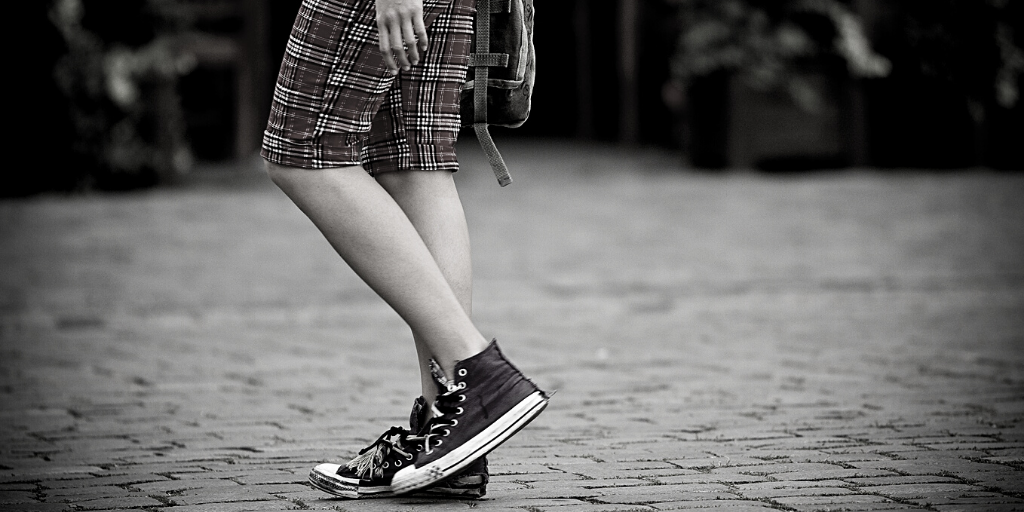
A survey of 71 organisations across 32 European countries finds that over 60% have worked with LGBTIQ youth experiencing homelessness, while homeless services lack the skills and competencies to provide safe and welcoming spaces for LGBTI people.
A report published today, based on a survey by ILGA-Europe in association with the LGBTIQ Youth Homelessness organisation True Colors United, and the Silberman Center for Sexuality and Gender (SCSG) at Hunter College, exploring the experiences of LGBTIQ focused organisations in Europe in working on the issue of LGBTI youth homelessness, points to a large prevalence of LGBTI youth homelessness across Europe, with over 60% of LGBTIQ organisations surveyed saying they have worked with young people who have experienced homelessness.
A comparative report from European Federation of National Organisations Working with the Homeless (FEANTSA) also finds that over 60% of homeless services organisations have dealt with young LGBTIQ people experiencing homelessness but often without any training or support. Nearly three-quarters (72%) of respondents indicated that no national policy exists specifically addressing the issue of LGBTI youth homelessness and over half of respondents (59%) reported a lack of governmental support for programmes that focus on LGBTI youth homelessness, including nearly half (47%) reporting a lack of funding support for such programmes.
The ILGA-Europe survey finds that the most prevalent cause for LGBTIQ youth homelessness is identity-related family conflict, as reported by 71%, while lack of institutional support and social rejection are reported by 44% as a major cause.
Just 17% of respondents said their government supports programmes targeting LGBTI youth homelessness.
According to Evelyne Paradis, Executive Director of ILGA-Europe: “Across the EU, there is a clear gap when it comes to data regarding LGBTI homeless people. And the lack of knowledge leads to a lack of targeted services, with people ending up in the streets. What is needed is for data collection to be stepped up across Europe, to better understand the phenomena. Based on improved knowledge, policy-makers need to work with service providers and LGBTI organisations in developing targeted solutions and support services to ensure LGBTI people are not left behind.”
The purpose of these surveys is to deepen understanding of the needs of LGBTI youth experiencing homelessness, how those needs are being met or not, and the successes and challenges that LGBTI-focused organisations face in working on the issue of LGBTI youth homelessness and in providing LGBTI youth experiencing homelessness with vital assistance.
Over half (56%) of respondents reported their work with LGBTI youth has been affected by the COVID-19 pandemic, with one organisation saying: “We have seen a heightening of the conflict level in domestic environments… Being unable to live their usual double-life and gain the emotional support from other peers who are also LGBTI persons with ethnic minority backgrounds, therefore increases tensions and have increased the risk of exposure among family members.”
Dr. Jama Shelton of True Colors United and Hunter College, said: “Understanding the challenges organisations face when working with LGBTI youth experiencing homelessness is a critical step in developing a comprehensive strategy for addressing the issue.”
The most commonly reported challenges for homeless services to addressing LGBTIQ youth homelessness included the organisation not knowing how to approach the topic of LGBTIQ identities; not being confident in its ability to speak about LGBTIQ issues; and fearing that some LGBTIQ young people will experience violence or abuse in the service setting if their sexual orientation or gender identity is made known.
According to Freek Spinnewijn, Director of FEANTSA: “A clear take away from our research is the need for partnership between our sectors. We need to share our joint expertise to close the existing gap between the homeless and LGBTIQ sectors, which has contributed to the hidden dimension of LGBTIQ homelessness across Europe. Through working together we can provide better and safer services for LGBTIQ youth ”
The ILGA-Europe report provides a baseline of knowledge regarding the experiences of LGBTI-focused organisations in Europe and Central Asia working on the issue of LGBTI youth homelessness. The findings suggest multiple opportunities for resource development, further research, and collaboration.
Evelyne Paradis concluded: “Together with authorities, both the LGBTI and homeless sector have a role to play in combating LGBTI people experiencing homelessness. The intersectional approach to this project is providing the ground-work for cooperation, identifying the scale of the problem and naming key obstacles to supporting LGBTI youth. The global COVID-19 crisis has brought so many vulnerable people in our society into focus, and we cannot look away. It is the responsibility of the European Commission and member states to propose meaningful action on how to tackle the crisis of inequality and to truly include LGBTI people in their measures and policies tackling homelessness.”
Background
Housing instability and homelessness impact LGBTI youth and young adults across the globe. In 2017, True Colors United began working with ILGA-Europe to organize a session on LGBTI youth homelessness at their annual conference, held in Warsaw, Poland. Since that time, the organisations have collaborated to provide workshops at ILGA-Europe’s annual conferences and worked together with The European Federation of National Organisations Working with the Homeless (FEANTSA) to better understand the realities of LGBTI youth homelessness in Europe.
True Colors United, FEANTSA and ILGA-Europe have worked together to create a plan for conducting research that would establish a baseline of understanding about LGBTI youth homelessness across LGBTI focused organisations and inform the development of resources to aid in addressing the challenges that organisations face when working on this critical issue. The survey, developed by ILGA-Europe and True Colors United and in collaboration with the Silberman Center for Sexuality and Gender at Hunter College, is the first step in that process.
Perceptions: Addressing LGBTI Youth Homelessness in Europe and Central Asia
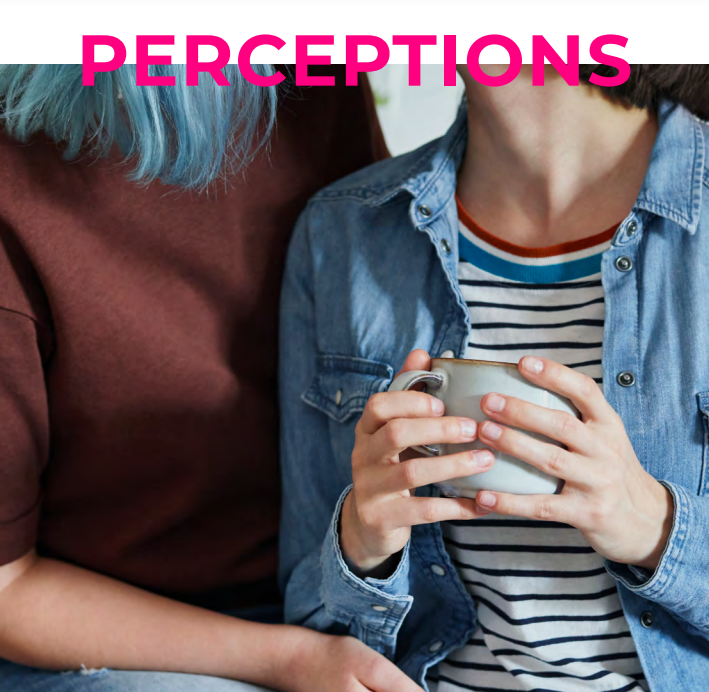
In April 2021, ILGA-Europe in association with the LGBTIQ Youth Homelessness organisation True Colors United, and the Silberman Center for Sexuality and Gender (SCSG) at Hunter College published a report based on a survey exploring the experiences of LGBTIQ focused organisations in Europe in working on the issue of LGBTI youth homelessness. It points to a large prevalence of LGBTI youth homelessness across Europe, with over 60% of LGBTIQ organisations surveyed saying they have worked with young people who have experienced homelessness.
A comparative report from European Federation of National Organisations Working with the Homeless (FEANTSA) also finds that over 60% of homeless services organisations have dealt with young LGBTIQ people experiencing homelessness but often without any training or support. Nearly three-quarters (72%) of respondents indicated that no national policy exists specifically addressing the issue of LGBTI youth homelessness and over half of respondents (59%) reported a lack of governmental support for programmes that focus on LGBTI youth homelessness, including nearly half (47%) reporting a lack of funding support for such programmes.
Major survey on LGBTIQ youth homelessness in Europe launched
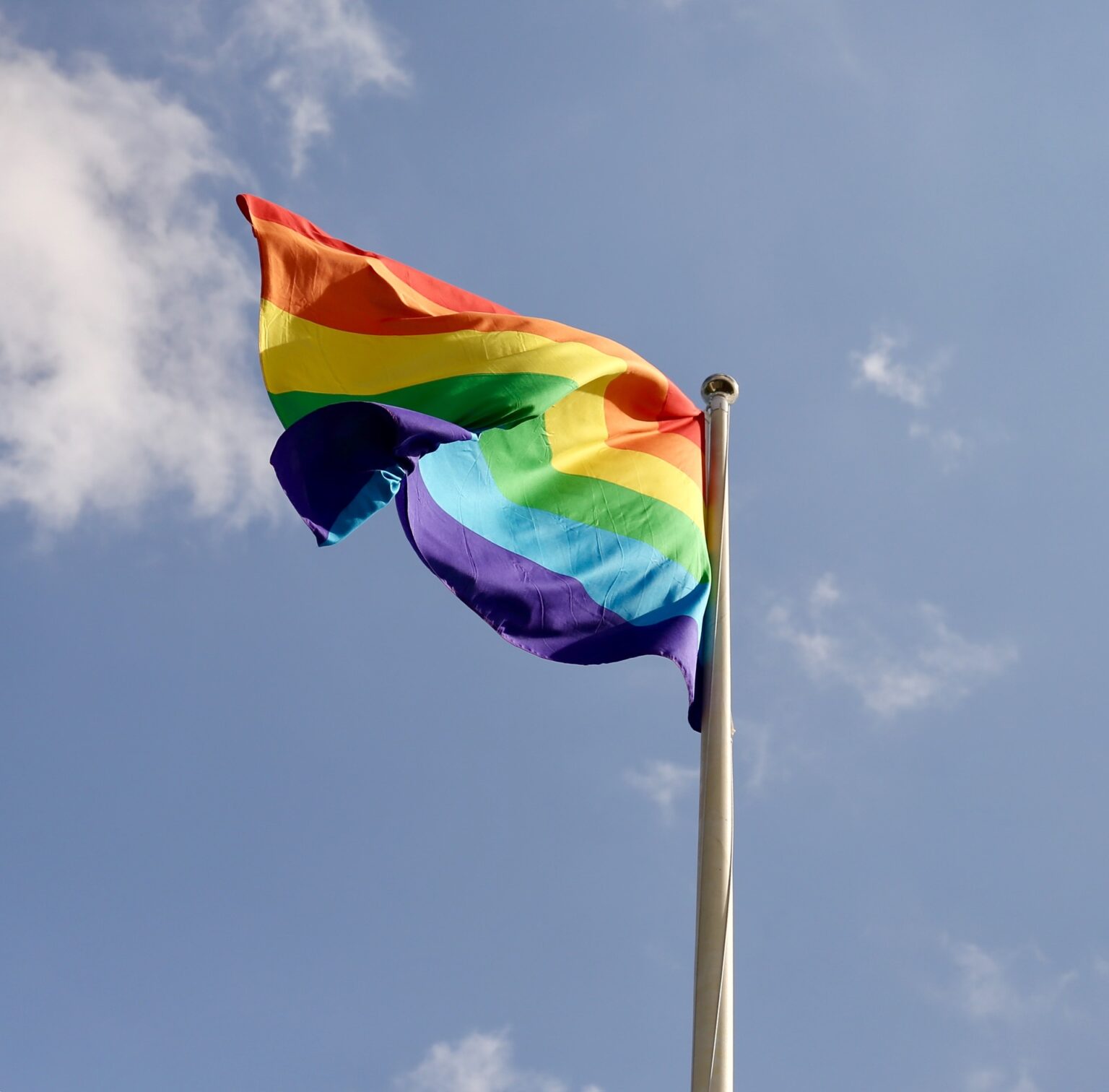
A new survey aims to guage the experiences of European and Central Asian groups and organisations when it comes to LGBTIQ youth homelessness.
Young LGBTIQ people are experiencing homeless every day, often rejected by parents, families and society because of their sexuality or gender identities. Yet, this is a much under-addressed issue in the European and Central-Asian region.
ILGA-Europe are partnering with key actors in the sector to raise awareness, increase collective knowledge and ultimately explore potential avenues for responses from the LGBTI movement to the problem. These partners include the international LGBTIQ youth homelessness organisation, True Colors United, the European Federation of National Organisations Working with the Homeless (FEANTSA) and the Silberman School of Social Work at the City University of New York.
Today, ILGA-Europe, in association with these partners, launch a survey to hear from LGBTIQ groups and organisations what their experience is when it comes to LGBTIQ youth homelessness, what initiatives they have taken, and most of all, what more is needed to further engage in such work.
This is part of ILGA-Europe’s broader effort to mobilise interest, knowledge and resources to tackle LGBTIQ youth homelessness in Europe and Central Asia. By taking this survey organisations will help ILGA-Europe in advocating for more resources and policies, in providing tools, developing knowledge, and bringing expertise to meet the needs of LGBTIQ young people who have become, or are at risk of becoming homeless.
According to Evelyne Paradis, Executive Director at ILGA-Europe: “By taking this survey, LGBTIQ organisations can help us do much needed work with our partners to address the issue of LGBTIQ youth homelessness in Europe and Central Asia. Knowledge of their experiences in addressing homelessness will inform our work with governments and funders, so that one day no young LGBTIQ person finds themselves without a home.”
The survey can be found here, and it takes approximately 15 minutes to complete.
After the Framework Directive
Combatting discrimination outside employment.
This ILGA-Europe’s policy paper argues that there is a clear need for the European Union to move quickly to complement the measures introduced in the area of employment with further legislation designed to prohibit discrimination in other spheres of life such as healthcare, education and housing.